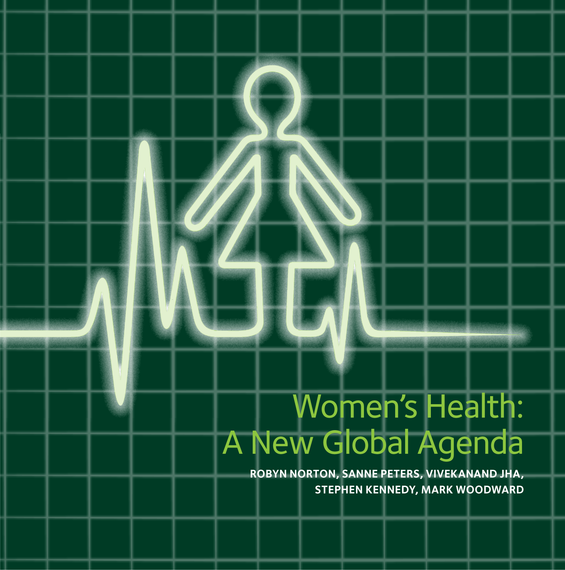In my lifetime, we've witnessed significant strides in advancing the collective rights, health and wellbeing of women around the globe. Today is a day for celebrating the progress we've made.
However, we cannot be complacent. We now confront a new range of health challenges, especially non-communicable diseases (NCDs), which arguably receive too little attention from the global health community.
For years, governments and leading global health organizations have focused attention and resources on improving sexual and reproductive health, with the key aim of reducing maternal mortality and morbidity -- and their efforts have been successful. But today, NCDs, such as heart disease, stroke, cancer, chronic respiratory disease and diabetes, have replaced maternal mortality and morbidity as the leading threats to women's health. NCDs account for seven of the top 10 killers of women, and 18 million women around the world die from them each year.
So it is timely that the women's health agenda move from a predominant focus on our reproductive organs and we reframe the discussion of women's health such that the focus expands to include women's whole bodies -- and the diseases that today are most frequently killing us.
As we do this, we must be careful to avoid another dangerous pitfall: being considered the same as men. (And yes, the irony of suggesting this on International Women's Day, of all occasions, isn't lost on me.)
We have fought and we continue to fight to be regarded equally, and rightfully so. But perhaps counter-intuitively, we must demand to be treated differently than men when it comes to our bodies and the global discussion on health care.
Why? Because women's bodies are different and health systems have a differential impact on women compared to men.
We now know that there are differences for women and men in both disease occurrence and outcomes. Yet, far too commonly, there is no examination of health data, separately for women and men, and women are underrepresented in many scientific and clinical studies.
Let's consider this issue with respect to diabetes.
In our recently published paper, Women's Health: A New Global Agenda, my co-authors and I highlighted strong and consistent evidence for a substantial sex difference in the effects of diabetes on the risk of another NCD: cardiovascular disease. Women with diabetes have a 44 percent higher risk of developing ischemic heart disease, and a 27 percent higher risk of stroke compared to men with diabetes. And, if that weren't enough, a recent report from the UK national diabetes audit found that women with diabetes were 15 percent less likely than affected men to receive the care recommended by national guidelines or to meet treatment targets.
But it's important to note that diabetes develops over decades -- meaning that we have an opportunity to identify individuals at high risk for diabetes and, subsequently, to intervene to prevent or delay the onset of the condition. Through prevention, we can save women's lives and maintain their wellbeing, but we have to start by understanding how risks of disease occurrence differ and then tailor prevention strategies to address the differential risks.
Moreover, we need to better understand how health systems differentially impact women and men and take these into consideration when determining health improvement solutions.
My colleague Mark Woodward, a co-author on our women's health paper, contributed to a study in the journal Surgery examining outcomes in post-surgery cancer patients in Southeast Asia. The study sought to identify factors associated with adverse outcomes such as death, treatment discontinuation, and financial catastrophe (defined as out-of-pocket costs of over 30 percent of yearly household income). Women were significantly more likely than men to experience financial catastrophe. This is a sad reality, and it again underscores the need to firstly examine health data separately for women and men, and then produce solutions that ensure better outcomes for women.
Many nations are making commitments to women's health, and that's an achievement worth celebrating. But if the approaches they implement don't take the realities of sex differences into consideration, we'll be sitting here in a few decades wondering why we achieved so little.
We have a small window of opportunity before national strategies, aimed at addressing the Sustainable Development Goals (SDGs), are firmed up and if these fail to deliver concrete plans to meet the SDG targets, then we will miss the opportunity to save millions of women dying prematurely. That is why we are calling for the United Nations and other UN agencies such as the World Health Organization to take the lead in ensuring that sufficient resources are put into reducing the burden of NCDs in women, and to ensuring a gendered approach to research and health systems development.
As we celebrate International Women's Day, and the decades of progress we've achieved, let's remain determined to continue the important, urgent work of improving the lives of all women. Complacency isn't an option. Let's remain focused on the future, where the new challenges lie.
Professor Robyn Norton is the Principal Director of The George Institute for Global Health. She is the lead author of a new report Women's Health: A New Global Agenda, a joint effort of the Oxford Martin School and The George Institute.
This post is part of a blog series produced by The Huffington Post in conjunction with International Women's Day, celebrated on March 8, 2016. A What's Working series, the posts address solutions tied to the United Nations' theme for International Women's Day this year: "Planet 50-50 by 2030: Step It Up for Gender Equality." To view all of the posts in the series, click here.

